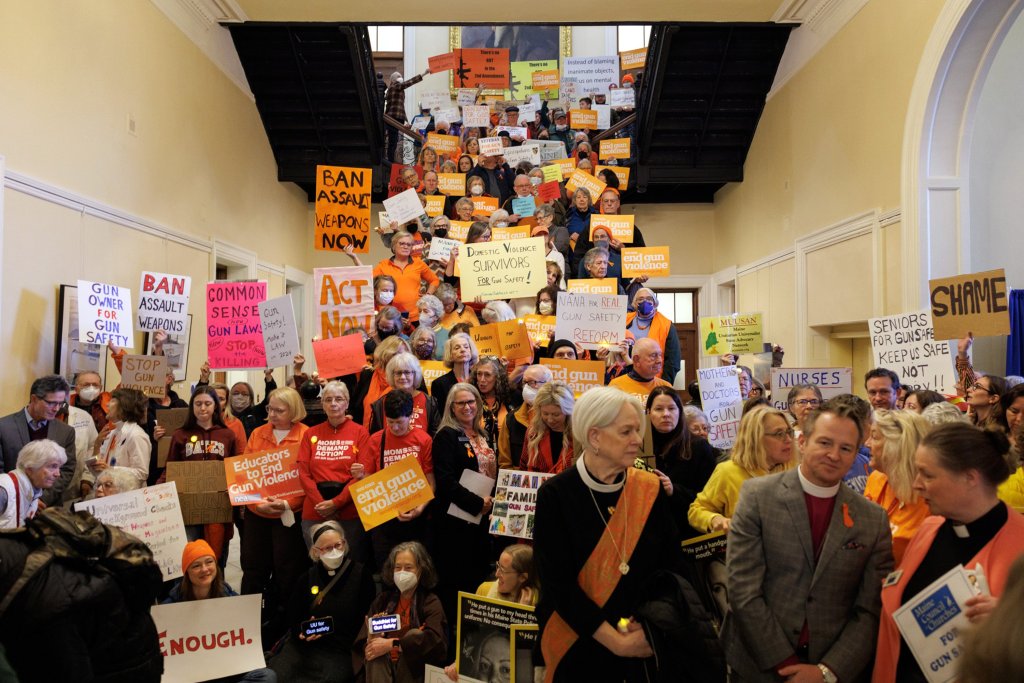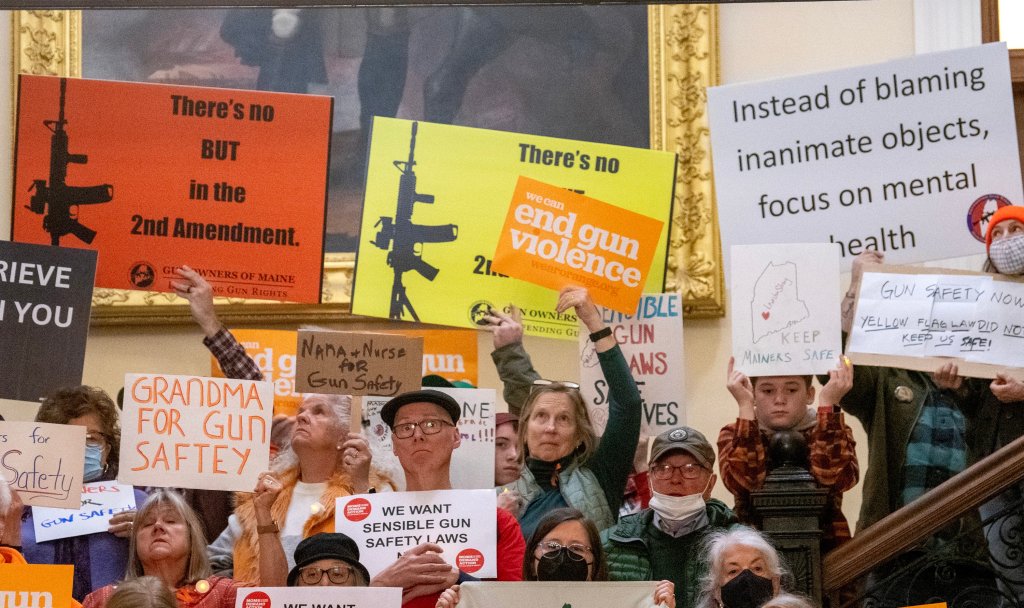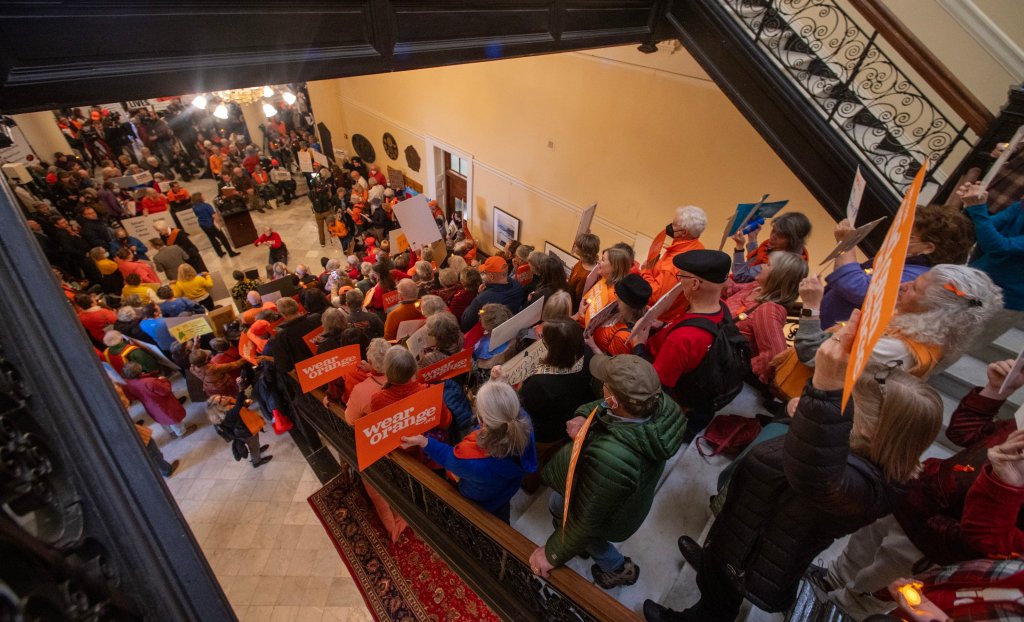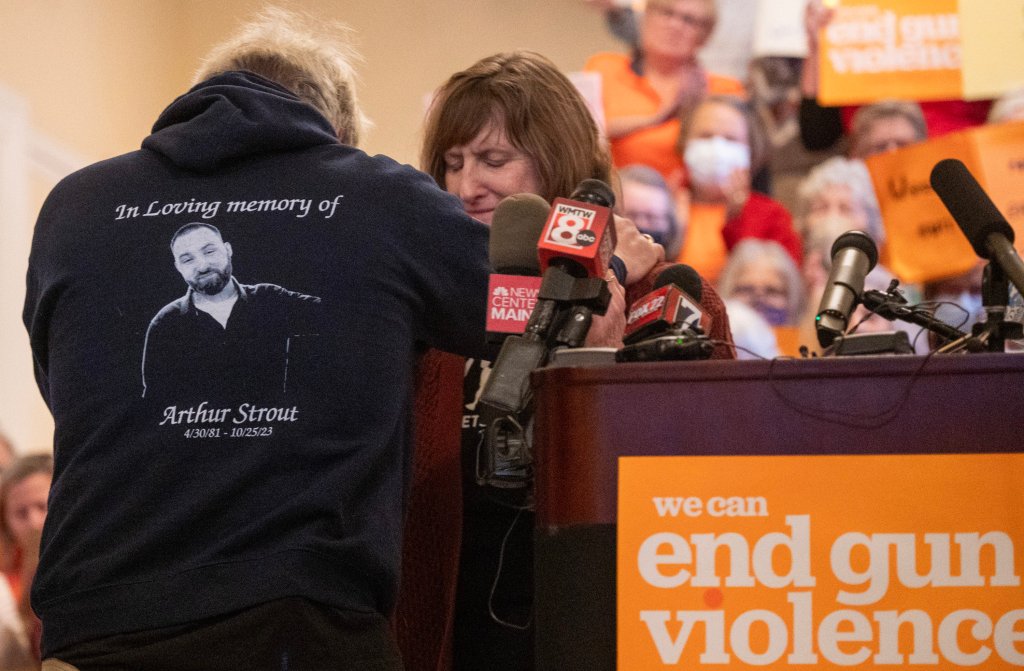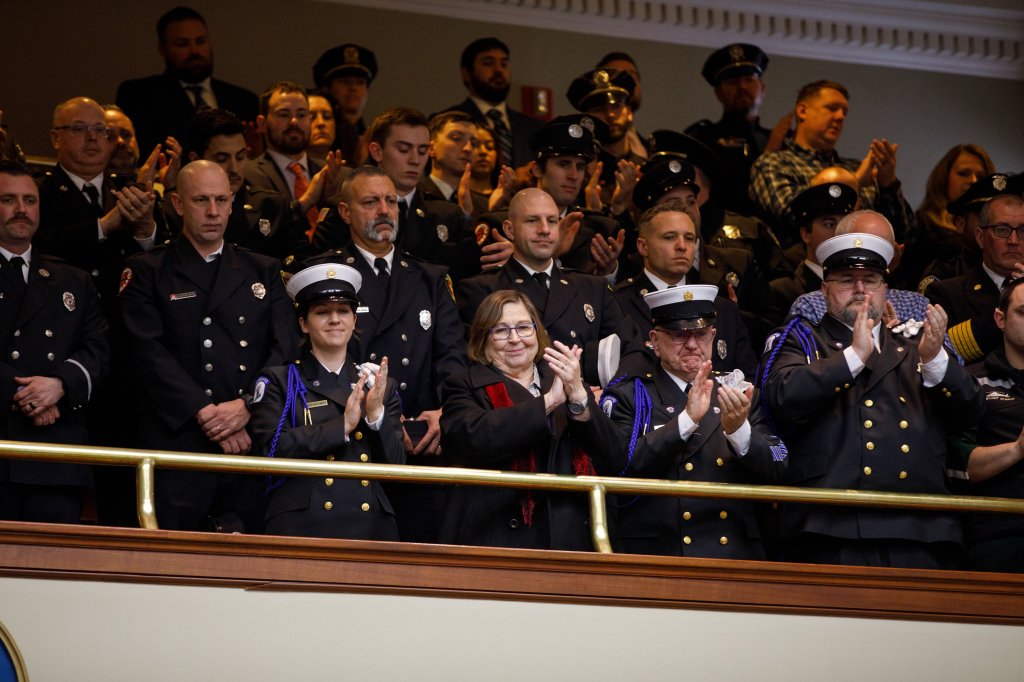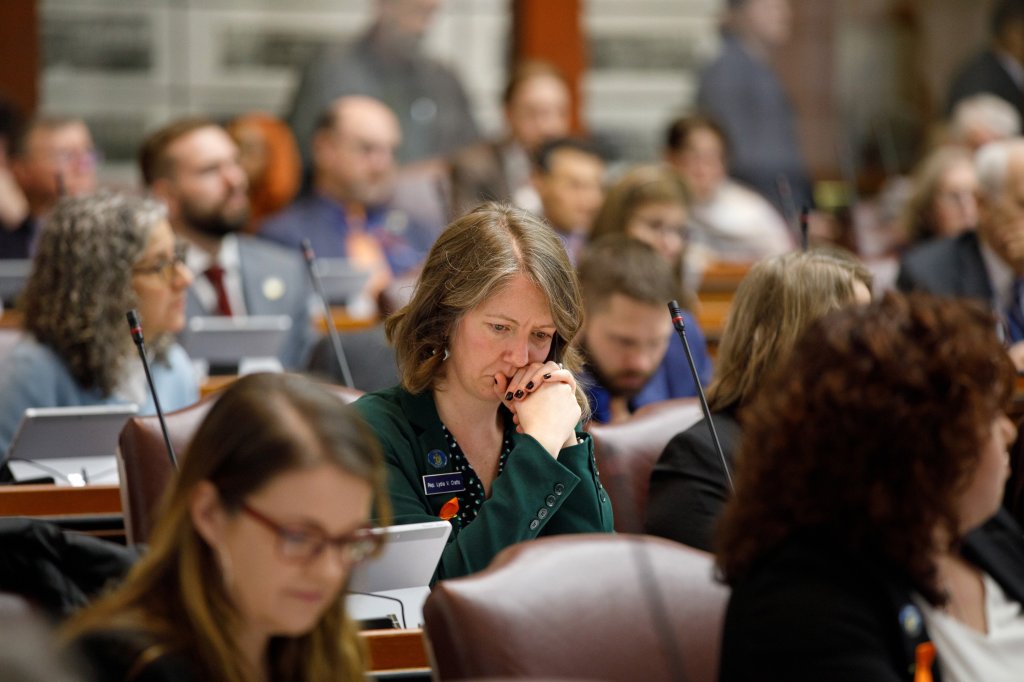AUGUSTA — Hundreds of people crowded into the State House Wednesday morning to call on lawmakers to pass stricter gun laws in their first legislative session since Maine’s deadliest mass shooting.
Advocates for gun safety reform filled the Hall of Flags to declare Maine’s current gun laws inadequate. Speakers called for action and people in the crowd carried signs that read, “Ban assault weapons now,” “End gun violence” and “Act now.” More than a couple hundred people were waiting in line to enter the State House when the news conference was already underway.
The rally on the first day of the new legislative session also drew demonstrators who were there to defend Second Amendment rights or to encourage mental health reforms instead of firearms restrictions. They carried signs that said, “More laws won’t make bad people go away” and “Guns save lives.”
‘MORAL OUTRAGE IS NOT ENOUGH’
Arthur Barnard, whose son Arthur Strout was one of 18 people killed in the Oct. 25 mass shooting at two locations in Lewiston, told the crowd that he respects gun owners’ rights, but more needs to be done to keep firearms out of the wrong hands.
“I understand people’s rights under the Second Amendment and the right to own and bear arms,” Barnard said. “Do I think people should own assault rifles? Not really. But here we are. … It’s not all about taking guns. It really isn’t.”
Barnard said laws need to be enforceable and that more needs to be done to close the loopholes that allowed Robert Card, the Lewiston shooter, to have access to the guns he used to kill 18 people and injure 13 more.
“How can we protect our children in schools if we have loopholes?” Barnard said. “We can’t. It’s impossible.”

Arthur Barnard, who lost his son Arthur Strout in the Oct. 25 mass shooting in Lewiston, speaks during a news conference Wednesday at the Maine State House in Augusta. Joe Phelan/Kennebec Journal
Card, a member of the U.S. Army Reserve, spent 14 days in a psychiatric hospital while training in New York over the summer. The incident and subsequent reports made to police in Maine about Card’s mental health have prompted questions about whether Maine’s yellow flag law could have been used to keep guns away from Card or what more could have been done to prevent the mass shooting.
Janel Crowley, a nurse at Maine Medical Center and chief steward for the Maine State Nurses Association/National Nurses United union, said that a lack of strong gun control laws is a threat to public health. “Nurses know that moral outrage is not enough, that thoughts and prayers do nothing to protect someone from a bullet,” Crowley said.
Crowley said she also has personally been impacted by gun violence – her father, who was bipolar and had PTSD, died by suicide with a gun. “The lack of background checks and red flag laws placed a gun in my father’s hands and left my mother without the love of her life, and my brother and I without our dad,” Crowley said.
BOTH SIDES AT RALLY
While speakers at the rally called for strengthening gun laws, some in the crowd disagreed.
“The issues we have are that the laws we already have on the books aren’t being enforced,” said Anne Amadon, of Skowhegan. She carried a sign that read, “This mom protects her family with guns.”
“Our mental health care is being grossly neglected,” Amadon said. “Not only are we seeing tragedies like in Lewiston, but so many people are just left hopeless because we don’t have the system we need.”
Donald Coston, of Richmond, said there should be more education around gun safety, but he doesn’t support some of the legislative proposals that advocates are seeking, such as a red flag law, universal background checks and a ban on assault weapons.
Red flag laws allow a family member, friend or police officer to seek an order to take away someone’s guns, at least temporarily. Maine has a yellow flag law, which places additional limits on the ability of authorities to take away someone’s weapons, including requiring a medical professional’s recommendation.
Coston worries about a lack of due process for people whose guns are taken using red flag laws. “I think you need due process before you take somebody’s rights away,” he said.
VICTIMS, FIRST RESPONDERS HONORED
Lawmakers immediately focused on the Lewiston mass shooting when they began the new session later Wednesday morning.
The Lewiston High School School Chamber Singers performed the national anthem in the Senate. Lawmakers in both the Senate and House passed resolutions honoring the shooting victims and first responders.

Kristen Cloutier, who represents Lewiston in the Maine House of Representatives, wipes her eye as Speaker of the House Rachel Talbot Ross reads the names of the 18 people who died in the Lewiston mass shootings, at the State House as lawmakers return for the start of the second regular session of the 131st Legislature on Wednesday. Brianna Soukup/Staff Photographer
“It’s been three months since the devastating attack in Lewiston,” Sen. Peggy Rotundo, D-Lewiston, told fellow senators. “The world may have moved on, but for the people of Lewiston, the surrounding communities and many in Maine, the healing is just beginning. The pain, the trauma and the anguish remain for many.”
In the House, two Democrats urged their colleagues to pass sensible gun reforms.
“Could we ever have an America where citizens don’t have weapons of war available to them to just shoot one another?” said Rep. Margaret Craven, D-Lewiston. “I’m not sure we can, and that’s a sad commentary. (But) you can make a difference today – everybody in this chamber – by passing sensible, safe gun legislation that will make a difference.”
Assistant House Majority Leader Kristen Cloutier, D-Lewiston, said lawmakers should not accept gun violence as a normal part of everyday life.
“Let us not normalize what has happened in our beloved Lewiston,” Cloutier said. “Let us remember Oct. 25 and vow to do more as a state to address gun violence and keep ourselves, our families, our friends and our neighbors safe.”
LAWMAKERS REACT
Lawmakers have proposed more than a half-dozen bill titles related to gun safety, mass shootings and mental health in the wake of Card’s rampage.
Two proposals – from Senate President Troy Jackson, D-Allagash, and House Speaker Rachel Talbot Ross, D-Portland – have been accepted for consideration, though details of the bills have yet to be published.
Jackson spokesperson Christine Kirby said the Senate president was moved by the number of Mainers who came to the State House to rally and have their voices heard Wednesday, and that he was especially touched by Barnard’s words.
“It’s clear that Mainers want and deserve action in response to the horrific mass shooting,” Kirby said in an email. “He is committed to working with his colleagues on both sides of the aisle to strengthen our laws to keep Mainers safe while also respecting the rights of responsible gun owners.”
She said details of Jackson’s bill, “An Act to Address Mass Shootings and Gun Violence in Maine,” are still being worked out with Rotundo, whom Jackson has said he plans to transfer sponsorship to.
Talbot Ross is sponsoring “An Act to Strengthen Public Safety, Health, and Well-being” along with a proposal for requiring background checks on certain firearms sales.

Gun rights advocates hold signs among the gun reform and gun safety supporters at the State House on Wednesday in Augusta. Brianna Soukup/Staff Photographer
In a prepared statement, Talbot Ross said legislation this session will revisit existing gun laws, like the yellow flag law, to determine if they need to be strengthened.
“Members will reconsider initiatives like expanded background checks, and debate whether now is the time to secure their passage,” she said.
“If today was any indication, there is strong support for bringing in representatives from both sides of the aisle, the Mills administration, and experts in law enforcement and behavioral health to take serious action to address the disturbing violence that occurs with unregulated dangerous weapons and inadequate funding of mental health services.”
Other proposals include a bill from Rep. John Andrews, R-Paris, to create a system for notifying firearms dealers about statewide law enforcement alerts concerning dangerous people or people in crisis.
Rep. Jim White, R-Guilford, has a bill that would allow people who are harmed in a “gun-free zone” to sue the owner of the facility for not providing adequate protection.
And some proposals – such as a bill from Rep. Laurel Libby, R-Auburn, that seeks to simplify the process health care providers must go through to offer new services or build a new facility – are aimed at addressing mental health in the wake of the shooting.
After the session, Senate Minority Leader Trey Stewart, R-Presque Isle, said that before commenting on any new legislation Republicans are interested in learning more about exactly what went wrong in the weeks leading up to the Lewiston mass shooting. Stewart noted that gun rights supporters were also at the State House, though they were fewer in number.
“Certainly emotions are high on both sides of that issue,” Stewart said, adding that new laws must not infringe on constitutional rights. “I do think there is still a lot of work to do to unpack exactly what happened and exactly what went wrong. We are committed to getting to the bottom of that and figuring out where the errors actually were in order to put our best foot forward from a policymaking standpoint. ”
Send questions/comments to the editors.





